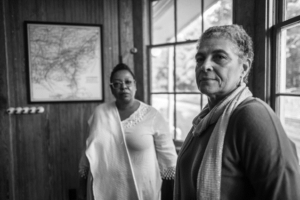
The Montpelier Descendants Committee and Montpelier’s professional staff are raising issue with the planned vote today by The Montpelier Foundation Board to retract its promise to share governance of President James Madison’s estate with descendants of the families whom Madison enslaved.
The move comes after the board has refused to consider nominees proposed by the Montpelier Descendants Committee to fill at least half of the board as per the terms of a bylaws change the board adopted last year.
MDC is a nonprofit organization that represents descendants of hundreds of people enslaved by the Madisons and their neighbors in the Virginia Piedmont. The Montpelier Foundation is a nonprofit organization dedicated to stewarding and interpreting the 2,650-acre presidential plantation; it leases the site from the National Trust for Historic Preservation.
MDC founding Chairman James French, who sits on TMF board, observed that “[j]ust a few years ago Montpelier was a pioneer in descendant engagement, but under new leadership TMF has treated descendants terribly. We’ve been used as a prop in a public performance to gain attention and money, while behind the scenes descendants and staff with whom we work well have been subject to racial animus and massive resistance. We will not be deterred from our mission to contribute to uniting the country by telling a more complete and truthful history of our founding, including the full role of its indispensable ‘invisible founders.’”
Montpelier staff allege CEO Roy Young has repeatedly threatened to terminate staff who support MDC, but today the majority of the estate’s full-time staff members issued a public statement calling on their employer to keep its commitment to the descendent community and change its abusive behavior toward Montpelier’s employees.
Nine months after the board pledged to share governance, only three MDC-nominated board members have been appointed to the board of 16 members. Today the board is expected to pass a resolution enabling the current white-dominated board to decide on new members “representing the descendant community” instead of accepting recommendations from the descendants’ chosen representative organization, MDC.
Yesterday, the National Trust warned TMF Board Chairman Gene Hickock “in the strongest possible terms,” against doing further harm. The letter states: “Most critically, this commitment [to parity with MDC] acknowledged the right of the descendant community to define itself, rather than to be defined by the Foundation [emphasis in original]. The newly proposed revisions to the bylaws would do the opposite. We believe this change would undermine decades of important work that led to the formation of the Committee in the first place, and in turn would set back Montpelier’s efforts to continue the necessary work of uplifting descendants’ voices, and repairing the relationship between the broader African American community and Montpelier, the former site of generations of enslavement.”
Dr. Matt Reeves, director of archaeology at Montpelier, was direct in his assessment of the situation: “The board’s resistance to full parity with the MDC rests in the threat they see in expanding the national narrative beyond the myth of the Founding Fathers to include all people in this history. The battle being carried out at Montpelier between the TMF board and the MDC and staff is sadly a modern version of the struggle between those with power and those without that we find in evidence in the archaeology at Montpelier.”
Before this regression, Montpelier had a substantial history as a model for descendant community engagement, starting in the 1990s when Rebecca Gilmore Coleman advocated for the preservation and restoration of buildings on the estate associated with enslaved people.
More recently, Montpelier staff and descendants convened a summit of 57 scholars and practitioners who developed a set of best practices for historic institutions that engage with the history of enslavement. The Rubric of Best Practices Established by the National Summit on Teaching Slavery encouraged the equitable inclusion of descendants within the board governance structure as the most ethical and exemplary model for relationship-building at such institutions.
This past June, TMF board voted to change the bylaws change to allow MDC to nominate “at least half” of Montpelier’s board members, a commitment referred to as structural parity that was widely praised at the time.
Montpelier’s board chair, Gene Hickok, and CEO Roy Young have sought to maintain the positive attention from their structural parity commitment while gutting its substance and attempting to sever longtime collaborations and friendships between MDC members and TMF staff. Hickok and Young have removed MDC members from board nomination decisions, excluded them from board meetings, and rerouted conversations with MDC representatives through lawyers.
TMF also sabotaged its parity commitment by appointing board members whom it touted as descendant representatives satisfying the goal of parity, but whom MDC had not endorsed, and who were in some cases publicly opposed to the existence of MDC. In an attempt to further restrict parity, TMF lawyers pressured MDC since the eve of the June 2021 vote on bylaw changes to sign a MOU to limit what MDC can say and do as a partner in power.
MDC’s lawyer, Greg Werkheiser of Cultural Heritage Partners PLLC, proposed a compromise in February that would allow TMF to reject MDC board nominees for ethical and legal reasons, but not because Black descendants “didn’t fit the profile of the current board.”
Werkheiser stated that “the whole point of including descendant voices is to broaden the perspective of leadership, not to reinforce a historically narrow approach to telling history.” TMF rejected MDC’s solution.
During the impasse, employees of the 80-person presidential house museum have experienced an increasingly hostile work environment. Dr. Elizabeth Chew, vice president and chief curator at Montpelier, noted that “[a]fter more than twenty years of partnership with descendants, Montpelier staff members have since 2020 been threatened with termination for contacting colleagues and friends in the descendants’ community. Montpelier leadership has lied to staff about progress toward sharing governance with MDC. All the while, important research and interpretation projects for which we have funding in hand and that depend on the relationship with MDC remain on hold.”
MDC is confident that the public will see this pattern of obstruction for what it is: an attempt to disempower Montpelier’s descendant community and staff, who have spent their lives dedicated to telling the full history of Montpelier, to allow wealthy, mainly white board members to continue to control the site’s narrative.
MDC board member Dr. Iris Ford, associate professor emerita of anthropology at St. Mary’s College of Maryland, remarked: “Our fight is about so much more than a historic plantation in rural Virginia. Over 200 years after the ratification of the Constitution, African Americans are still fighting for the protection and liberties that it claims to guarantee. What we are doing at Montpelier is fighting for the very soul of our nation.”
Dr. Bettye Kearse, MD, one of the few descendent members of Montpelier’s board and author of The Other Madisons: The Lost History of a President’s Black Family, confirmed that “MDC remains committed to the rich and important history told at Montpelier, to the beauty and power of the Montpelier estate and grounds, and to the longevity and strength of The Montpelier Foundation. MDC members have spent decades of their lives researching Montpelier’s history and archaeology and developing innovative and award-winning historical interpretation projects. Montpelier is not the board, but the board must be receptive to substantive change for Montpelier to survive and thrive.”
Werkheiser concluded, “The public tends to think of the battle for civil rights as taking place through speeches, marches, and courtrooms. But the modern struggle for fairness also occurs in quiet board rooms of places like Montpelier, and only comes to light when people like the descendants and staff say, ‘Enough is enough.’”










